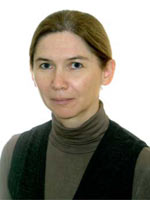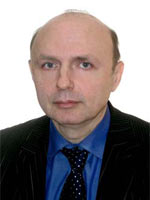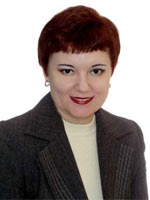Computer Modelling of Verbal Communication
Basic Division: Department of Speech Communication.
Brief Description of Research Activities
The trend was established on the basis of the following scientific schools: Derivation Linguistics (Doctor of Philology, Professor L.N. Murzin), Functional Stylistics (Doctor of Philology, Professor M.N. Kozhina), and Psycholinguistics (Doctors of Philology, Professors L.V. Sakharny and A.S. Shtern). A combination of formal and functional approaches, discursive and experimental investigation of linguistic competence allows to build volumetric models of verbal communication in the process of social interaction. Doctor of Philology, Professor V.A. Salimovsky presenting the School of Functional Stylistics, is developing Verbal Communication Theory regarding various types of discourse. Doctor of Philology, Professor V.A. Mishlanov continuing L.N. Murzin’s scientific traditions is developing Dynamic Linguistics based on the investigation of discourse and syntax of the contemporary and old Slavonic languages. Doctor of Philology, Professor I.G. Ovchinnikova specialises in Psycholinguistics and Computer Modeling of linguistic competence and verbal communication. Establishing the Department of Verbal Communication and the specialty “Theoretical and Applied Linguistics” allowed carrying out profound research and using the achieved results in education.
The scientific object of the trend is speech activity as one of the components of social interaction. The scientific subject of the trend is a psycholinguistic basis of speech activity, mechanisms of speech and communication.
The main scientific problems studied by the scholars within the trend are the following:
- Study the specificity of speech mechanisms (associative, neuropsychological, perceptive mechanisms etc.) and their description in various aspects (functional, psycholinguistic, cognitive);
- Identification of stages of language mastering (native/foreign language) and description of various types of bilingualism;
- Development of databases and thesauruses to systematise language data and store them for scientific use;
- Modelling various aspects of speech activity (formal and reconstructing models).
Selected Publications Characterising Scientific Research Trend
1. Ovchinnikova I.G., Uglanova I.A. Computer modeling of verbal communication. Moscow: Flinta: Science, 2008. – 140 p. (In Russian)
2. Ovchinnikova I.G. Communication, situation, act in the aspect of narration // Psychology, Linguistics and interdisciplinary relations. Moscow: Sense, 2008. pp. 39-59. (In Russian)
3. Ovchinnikova I.G. Examination of content efficiency in regional mass media texts. Perm: Perm State University, 2007. – 215 p. (In Russian)
4. Ovchinnikova I. G. Slips of the tongue in children’s narratives: connectionists’ interpretation. Psychology of Language and Communication, 2007, 11(1), 23 – 41. (In English).
5. Mishlanov V.A. On the subject, urgent problems and tasks of Forensic Linguistics // Communicative technologies in education, business, politics and law of the XXIst century: Man and his discourse – 2: Symposium book. Volgograd. Publishing house “PrinTerra”. 2006. pp. 292 – 303. (In Russian)
6. Mishlanov V.A. Linguistic and communicative features of manipulative texts // Forensic Linguistics – 8: Russian language and contemporary Russian law. Inter-university collection of papers. Kemerovo-Barnaul, 2007. pp. 203 – 216. (In Russian)
7. Mishlanov V.A., Salimovsky V.A. Towards theoretical basics of Forensic Linguistics // Siberian Philological Journal. 2010, № 4. pp. 214-222. (In Russian)
8. Mishlanov V.A., Salimovsky V.A. Understanding of an utterance and personality component of pragmatical context // Language being of man and ethnos: psycholinguistic and cognitive aspects. Moscow: Institute for Scientific Information and Social Sciences of the Russian Academy of Sciences, Social Management Academy, 2010. pp. 95-102. (In Russian)
9. Salimovsky V.A. Communicative image of a personality (motivational aspect) // I and the Other in the text. Perm, Ljubljana, 2009. Iss. 2. pp. 347-364. (In Russian)
10. Salimovsky V.A., Mekhonina E.N. Typical mistakes (tricks) in the incompetent forensic-linguistic examination // Perm State University Herald. Russian and Foreign philology. Iss. 2 (8), 2010, pp. 48-51. (In Russian)
The Most Significant Fundamental Research Projects
1. 2005-2007 – The grant of Russian Foundation for Basic Research, project “Dynamics of linguistic competence in the ages 5-12: long-term discourse investigation”.
2. 2007-2008 – The grant of Russian Foundation for the Humanities, project “Linguistic, social and cultural space: image of a Russian city in citizens’ consciousness”.
3. 2007-2009 – The grant of Russian Foundation for the Humanities, project “Individualised associations of significant concepts: Russia from the youth’s point of view”.
4. 2010-2012 – The grant of Russian Foundation for Basic Research, project “Bilingual variability depending on linguistic (likeness of contacting languages) and neuropsychological (neuropsychological profile of a bilingual person) factors: connectionist modeling”.
5. 2011 – The grant of Russian Foundation for the Humanities (regional), project “Discourse of War as anti-culture (case study of the Perm Region mass media texts)”.
The Most Significant Applied Research Projects
1. 2005-2006 – The grant of Russian Foundation for the Humanities (regional) № 05-04-82407 а/У, project “Towards the development of Forensic Linguistics in the Perm Region. Principles and methods of forensic linguistic text examination”.
2. 2008-2009 – The grant of Russian Foundation for the Humanities (regional) 08-04-82406 а/У, project “Towards the development of Forensic Linguistics in the Perm Region: improvement of methods of linguistic examination of conflict texts”.
Training of Researchers (Post-graduate and Doctoral Programmes):
2006-2010 – 4 scholars were conferred the degree of Candidate of Philology.







